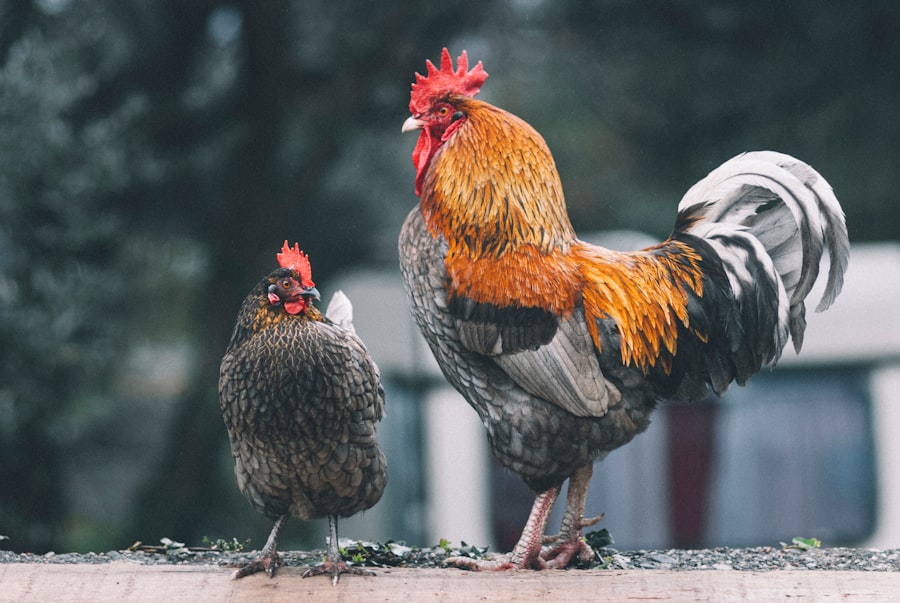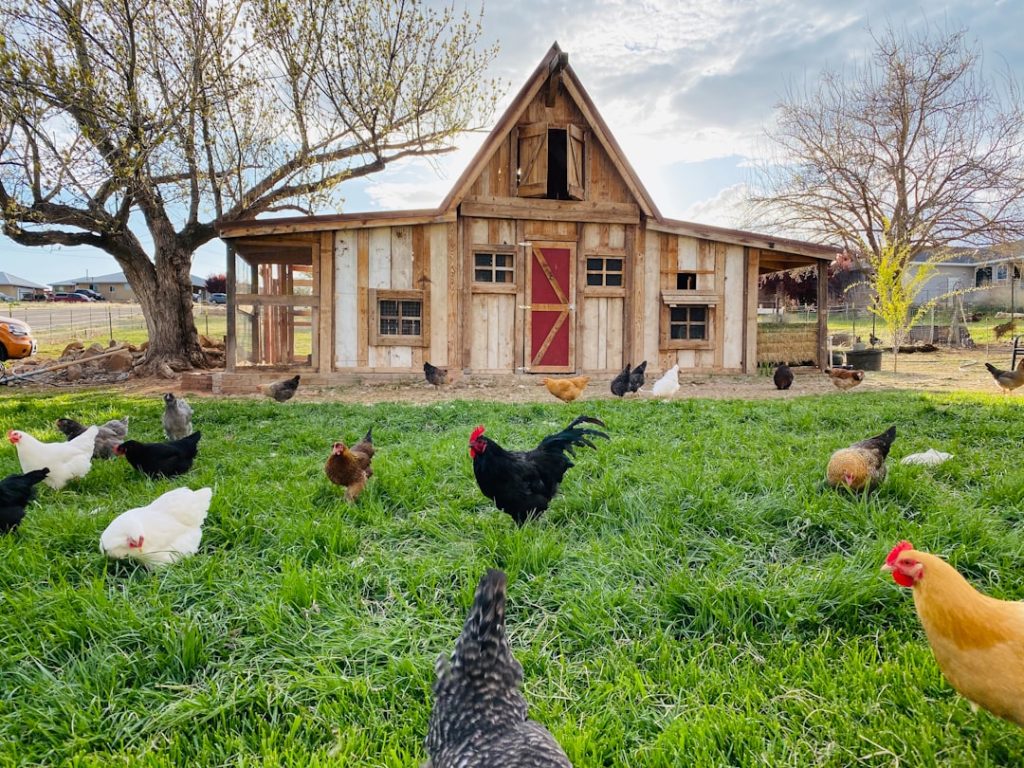Keeping chickens has a long history that dates back thousands of years. Chickens were first domesticated in Southeast Asia around 6000 BC and have since spread to every corner of the globe. Initially, chickens were primarily kept for their eggs and meat, but over time they have also become popular as pets and for their ability to control pests in gardens.
There are numerous benefits to keeping chickens. One of the main advantages is the fresh supply of eggs that they provide. Homegrown eggs are not only delicious but also more nutritious than store-bought eggs, as they are free from antibiotics and hormones. Chickens also help to reduce kitchen waste by eating scraps and leftovers, which can significantly reduce household waste. Additionally, chickens produce high-quality fertilizer that can be used to enrich the soil in gardens.
Key Takeaways
- Keeping chickens can be a fun and rewarding hobby for those with outdoor space.
- Chicken coops are essential for keeping chickens safe and healthy.
- When choosing a chicken coop, consider factors such as size, ventilation, and predator protection.
- Building your own chicken coop can be a cost-effective option, but requires some DIY skills.
- Proper feeding, watering, cleaning, and egg collection are important for maintaining happy and healthy chickens.
Understanding Chicken Coops
A chicken coop is an essential component of keeping chickens. It provides a safe and secure space for the chickens to live, sleep, and lay eggs. A well-designed coop also helps to protect the chickens from predators such as foxes, raccoons, and birds of prey.
There are several basic components that every chicken coop should have. Firstly, it should have a sturdy structure with walls and a roof to protect the chickens from the elements. The coop should also have proper ventilation to ensure good air circulation and prevent the buildup of moisture, which can lead to respiratory problems in chickens. Additionally, the coop should have nesting boxes where the hens can lay their eggs, as well as roosting bars for the chickens to perch on at night.
Choosing the Right Chicken Coop
When choosing a chicken coop, there are several factors to consider. Firstly, you need to determine how many chickens you plan to keep, as this will determine the size of the coop you need. It is recommended to allow at least 4 square feet of space per chicken inside the coop and 10 square feet per chicken in the outdoor run.
Another factor to consider is the climate in your area. If you live in a cold climate, you will need a coop that is well-insulated and has a heat source to keep the chickens warm during the winter months. On the other hand, if you live in a hot climate, you will need a coop that is well-ventilated and provides shade for the chickens.
There are also different types of chicken coops to choose from. The most common types include traditional wooden coops, mobile coops (also known as chicken tractors), and converted sheds or outbuildings. Each type has its own advantages and disadvantages, so it is important to choose one that suits your needs and preferences.
Building Your Own Chicken Coop
Building your own chicken coop can be a rewarding and cost-effective option. One of the main advantages of building your own coop is that you can customize it to meet your specific needs and preferences. You can choose the size, design, and materials that you prefer, and add any additional features that you think are necessary.
To build a chicken coop, you will need several materials. The main material is wood, which can be used for the walls, roof, and floor of the coop. Other materials that you will need include wire mesh for the windows and doors, screws or nails to hold everything together, and roofing material to protect the coop from rain and snow.
It is also important to have some basic carpentry skills and tools to build a chicken coop. These include a saw, drill, hammer, measuring tape, and level. If you are not confident in your carpentry skills, there are also pre-made chicken coop kits available that come with all the necessary materials and instructions.
Setting Up the Coop
Before setting up the chicken coop, it is important to prepare the location where it will be placed. The coop should be located in a well-drained area that is not prone to flooding. It should also be placed in a spot that receives plenty of sunlight during the day, as chickens need natural light for their health and well-being.
Once the location is prepared, you can start assembling the chicken coop. Start by building the base of the coop, which should be raised off the ground to prevent moisture and predators from getting in. Then, attach the walls and roof to the base, making sure they are securely fastened. Finally, install the windows and doors, and add any additional features such as nesting boxes and roosting bars.
Feeding and Watering Chickens

Proper nutrition is essential for the health and well-being of chickens. There are several types of chicken feed available, including pellets, crumbles, and mash. Pellets are a popular choice as they contain a balanced mix of grains, protein, vitamins, and minerals. Crumbles are similar to pellets but are smaller in size, making them easier for young chicks to eat. Mash is a finely ground feed that can be mixed with water to form a porridge-like consistency.
In addition to feed, chickens also need access to fresh water at all times. There are several watering systems available for chickens, including gravity-fed waterers, nipple waterers, and automatic waterers. Gravity-fed waterers are the simplest option and consist of a container filled with water that is connected to a trough or bowl. Nipple waterers have small metal nipples that release water when the chickens peck at them. Automatic waterers are connected to a water source and refill automatically when the water level gets low.
Cleaning the Coop
Cleaning the chicken coop is an important task that should be done regularly to maintain a healthy environment for the chickens. A clean coop helps to prevent the buildup of bacteria and parasites, which can cause diseases in chickens.
To clean the coop, start by removing all the chickens and their bedding. Use a shovel or rake to remove any droppings and soiled bedding from the coop. Then, use a hose or pressure washer to thoroughly clean the walls, floor, and nesting boxes. Allow the coop to dry completely before adding fresh bedding and returning the chickens.
It is also important to regularly clean and disinfect the waterers and feeders to prevent the growth of bacteria. This can be done by soaking them in a solution of water and bleach or using a commercial poultry disinfectant.
Collecting and Using Eggs
Collecting eggs is one of the most enjoyable aspects of keeping chickens. To collect eggs, simply lift up the hens’ nesting boxes and gently remove the eggs. It is important to collect eggs daily to prevent them from getting dirty or broken.
There are numerous ways to use eggs in cooking. They can be used in a variety of dishes such as omelettes, quiches, cakes, and cookies. Eggs can also be boiled, poached, or scrambled for a quick and nutritious meal. Additionally, eggs can be preserved by pickling or freezing them for later use.
Caring for Chickens in Different Seasons
Caring for chickens in different seasons requires some adjustments to ensure their health and well-being. In hot weather, it is important to provide shade for the chickens to prevent heat stress. This can be done by placing the coop in a shaded area or providing a covered run or tarp for shade. It is also important to provide plenty of fresh water and ensure that it is kept cool by adding ice cubes or freezing water bottles.
In cold weather, it is important to insulate the coop to keep the chickens warm. This can be done by adding extra bedding such as straw or wood shavings, sealing any drafts or gaps in the coop, and using a heat source such as a heat lamp or heated waterer. It is also important to provide extra feed during the winter months, as chickens require more energy to keep warm.
Enjoying Your Chickens and Coop
Keeping chickens can be a rewarding and enjoyable experience. Not only do chickens provide fresh eggs and help to reduce waste, but they also make great pets and can be a source of entertainment and companionship. By following the tips and guidelines outlined in this article, you can create a safe and comfortable environment for your chickens and enjoy all the benefits that come with keeping them. So why not give it a try and start your own backyard flock today?
If you’re interested in learning more about keeping chickens, you’ll definitely want to check out this informative article on building an A-frame chicken coop. It provides step-by-step instructions and helpful tips for creating a safe and comfortable home for your feathered friends. Whether you’re a beginner or an experienced chicken keeper, this guide will surely come in handy. And if you’re considering expanding your flock to include ducks, you might also find this article on duck mating season quite interesting. It offers valuable insights into the breeding habits of ducks and provides guidance on how to ensure a successful mating season. Lastly, if you’re looking for a fun and innovative way to enhance your chicken coop, don’t miss this article on the chicken coop trampoline. It explores the benefits of adding a trampoline to your coop and explains how it can improve the overall well-being of your chickens. Happy reading!
FAQs
What are the benefits of keeping chickens?
Keeping chickens can provide a source of fresh eggs, fertilizer for gardens, and can be a fun and educational experience for kids.
What do chickens need to be healthy and happy?
Chickens need a clean and safe living space, access to fresh water and food, and protection from predators. They also need space to roam and scratch.
What kind of housing do chickens need?
Chickens need a coop that is dry, well-ventilated, and predator-proof. The coop should also have nesting boxes for laying eggs and perches for roosting.
What do chickens eat?
Chickens eat a variety of foods including chicken feed, grains, fruits, vegetables, and insects. It’s important to provide them with a balanced diet and access to fresh water at all times.
How often do chickens lay eggs?
Chickens typically lay one egg per day, but this can vary depending on the breed and age of the chicken. Some chickens may lay more or less frequently.
What should I do with the eggs my chickens lay?
You can collect the eggs and use them for cooking or baking. It’s important to wash the eggs before using them to remove any dirt or bacteria.
What are some common health issues that chickens may face?
Chickens may face health issues such as mites, lice, respiratory infections, and egg-laying problems. It’s important to monitor your chickens’ health and seek veterinary care if necessary.
Can chickens be kept in urban areas?
Yes, chickens can be kept in urban areas as long as local laws and regulations allow it. It’s important to consider the noise and odor that chickens may produce and to be a responsible neighbor.
Meet Walter, the feathered-friend fanatic of Florida! Nestled in the sunshine state, Walter struts through life with his feathered companions, clucking his way to happiness. With a coop that’s fancier than a five-star hotel, he’s the Don Juan of the chicken world. When he’s not teaching his hens to do the cha-cha, you’ll find him in a heated debate with his prized rooster, Sir Clucks-a-Lot. Walter’s poultry passion is no yolk; he’s the sunny-side-up guy you never knew you needed in your flock of friends!







